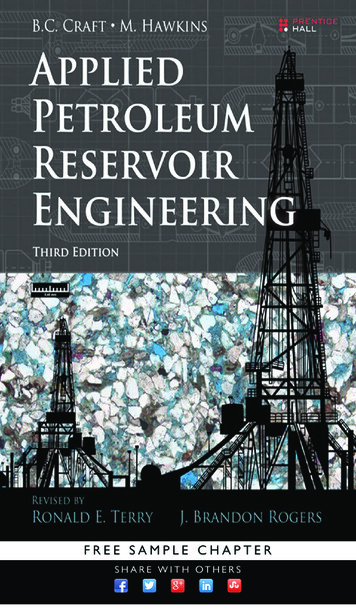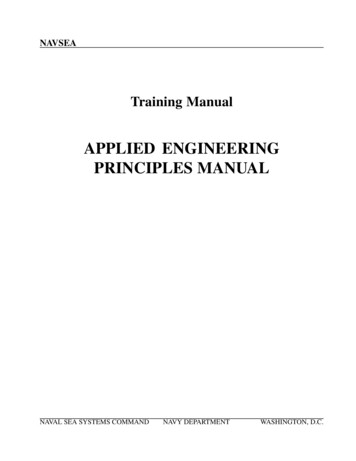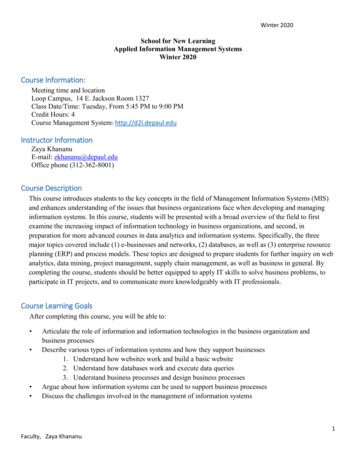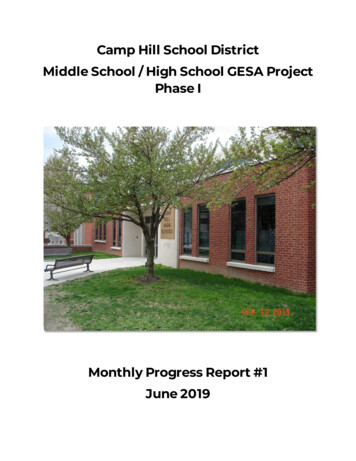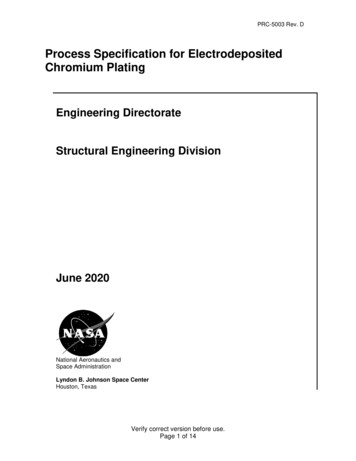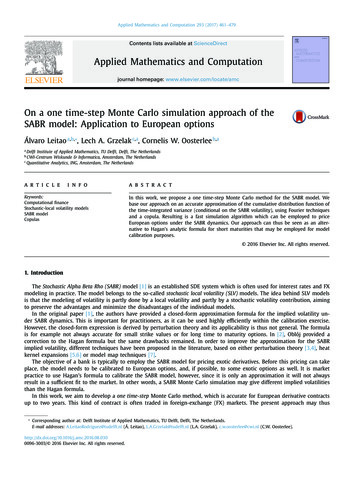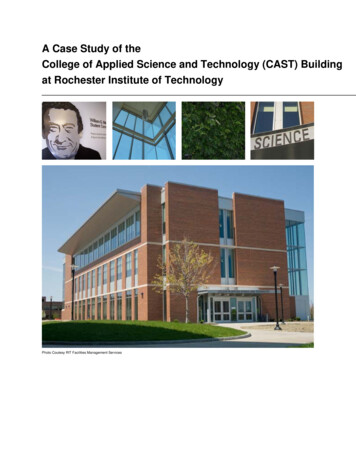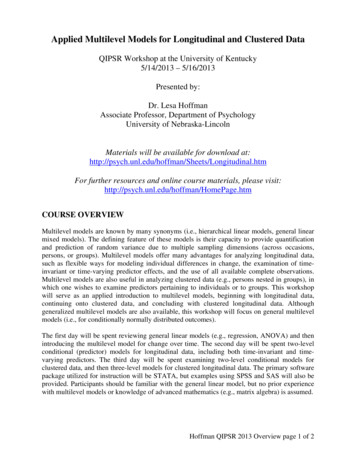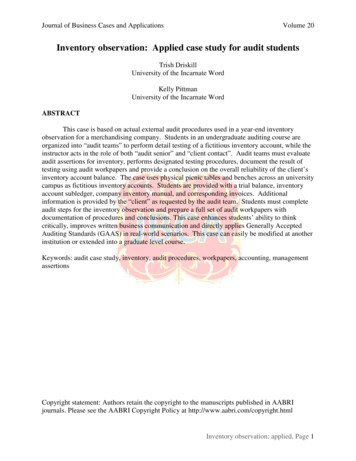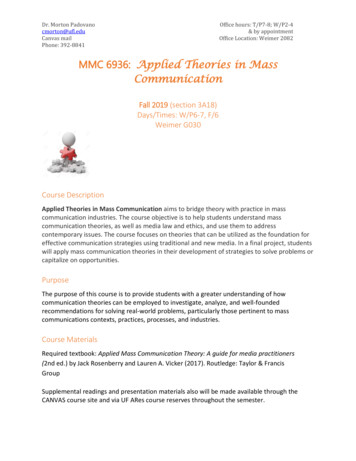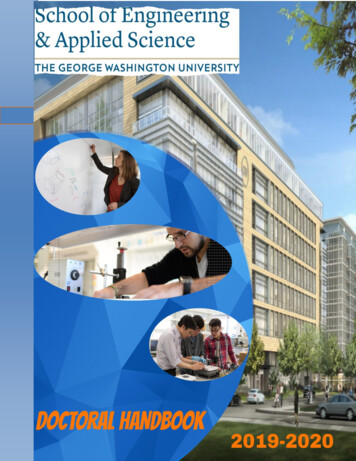
Transcription
School of Engineering and Applied Science
School of Engineering and Applied ScienceTABLE OF CONTENTSWelcome from the Dean of the School of Engineering and Applied Science iiiThe Academic Calendar 2019-2020 . .ivQuick Reference.vSchool and Department Contacts.viSEAS Computing Facility. viIntroduction.viiGraduate Degree Programs1.Doctoral Degree Program (Ph.D.) . 12.1.2.2.2.3.2.4.3.PagesEntrance Requirements . 1Program Requirements . .1Department Specific Requirements .2Transfer of Credit . 3Time Limits . 3Continuing Research. 3Continuous Enrollment and Maintaining Residence. 4Termination of the Program . 4Pre-candidacy . 5Academic Advisor . 5Program Plan of Study: DegreeMap . 5Minimum Course and Research Requirements . 6Grading . 7Changes to the Program Plan of Study . 7Exploration of Possible Dissertation Topics . 7Preliminary/Qualifying Examination . 7Candidacy . 8Dissertation Research.8Research Advisor. . 8Dissertation Research Proposal. 9Dissertation Committee . 9Guidelines for the Dissertation . 9Enrollment in doctoral research courses 398, 399 . 10Dissertation Defense . 11Planning and Procedures . 11Graduation . 11Application for Graduation . 11Graduation Clearance / Checklist . .11Commencement. 13Graduation Survey. 14After Graduation. 14Academic Department Specific Rules 16
School of Engineering and Applied Science3.1.3.2.3.3.3.4.3.5.3.6.4.Department of Biomedical Engineering . 16Department of Civil and Environmental Engineering . 16Department of Computer Science . 16Department of Electrical and Computer Engineering . 16Department of Engineering Management and Systems Engineering . 16Department of Mechanical and Aerospace Engineering . 16Registration Procedures . 17Late Registration. 17Adding / Dropping courses . 17Withdrawal / Incompletes . 18Late Withdrawal . 18Complete Withdrawal from the University . 195.Financing Your Graduate Education . 195.15.2Financial Support . 19Office of Graduate Student Assistantships and Fellowships. 19Assistantships . 19Fellowships, Scholarships, and Related Programs . 19External Funding Opportunities for Graduate Students . 20Loan Funds . 22Student Employment . 22International Students . 22Veteran Students . 23Financial Information. 24Tuition Fees . 24Voluntary Library Fee . 24Past Due Accounts . 24Withdrawals and Refunds . 24AppendicesAppendix A:Appendix B:Appendix C:Appendix D:Appendix E:Forms.26Doctoral Student Checklist. 42Dissertation Guidelines. 45ETD - Electronic Submission Requirements.47Ph.D. Dissertation Completion Checklist . . 72
School of Engineering and Applied ScienceWelcome from Your New DeanJohn LachDean, School of Engineering and Applied ScienceIn 1884, William W. Corcoran transformed science andengineering education in the District of Columbia when hefounded the Corcoran Scientific School, now known as TheGeorge Washington University’s School of Engineering andApplied Science (SEAS). Corcoran was a retired banker whosaw the world’s growing confidence in scientific discovery inthe late 1800s and marveled at the impact of technologicaladvances in his own lifetime. Not wanting the District to bewithout such a center of scientific discovery—at a time whenthe first steel frame skyscraper was constructed, when gaspowered automobiles were first being designed and built, when electric lighting wasbecoming commercially available—Corcoran paved the way for future discoveries andtransformation by providing the founding gift for the School.Today, GW continues to transform science and engineering education and research in Washington,DC—now in our state-of-the-art Science and Engineering Hall (SEH). This 500,000 gross-squarefeet, 14-story structure opened in 2015 and includes new labs and core facilities that enable studentsand faculty to conduct on-campus, state-of-the-art research across many disciplines. It also providescollaborative learning spaces and facilities appropriate for hosting major symposia and workshops.The School’s academic programs provide top-notch opportunities for learning, equal to the quality ofthe new facilities that host them. Through its six departments—Biomedical Engineering; Civil andEnvironmental Engineering; Computer Science; Electrical and Computer Engineering; EngineeringManagement and Systems Engineering; and Mechanical and Aerospace Engineering—SEAS offersgraduate study leading to the degrees of Master of Science, Master of Engineering, Doctor ofPhilosophy, and Doctor of Engineering. The School also offers many graduate level certificateprograms through its departments.Research labs, centers, and institutes offer opportunities for student and faculty research,strengthening ties with counterparts in government and industry and contributing to the developmentand harnessing of emerging technologies. The School is also centrally positioned within GW—aworld-class comprehensive university—providing opportunities that connect engineering to health,policy, international affairs, and other critical aspects of society.As you embark on your Ph.D., I welcome you on behalf of the GW community, of which you are now apart. Your research—as evidenced through publications, presentations, innovations, and impact onyour field and our broader society—will not only reflect well on you but will also bring recognition toSEAS and GW. Best wishes for an enriching, successful, and impactful Ph.D. experience in SEAS atGW!Doctoral Student Handbook 2019-2020vi
School of Engineering and Applied ScienceGW Academic Calendar: 2019-2020Please note that these dates are subject to change. http://bulletin.gwu.edu/academic-calendar/Offices Closed During Winter HolidayFall 2019CLASSES BEGINLabor Day (no classes)Thanksgiving BreakLast Day of Fall SemesterClassesReading DaysFinal examinations(M) August 26(M) September 2(W-F) November 27-30(F) December 9(R) December 11December 12-20Spring 20202011SPRING SEMESTER 2009CLASSES BEGINMartin Luther King DayPresidents' DaySpring BreakLast Day of ClassesMake-up Reading DaysDesignated MondayFINAL EXAMINATIONSCommencement WeekendSpring Degree ConferralDoctoral Student Handbook 2019-2020(M) January 13(M) January 20(M) February 17(M-S) March 16-21Monday, April 27(T) April 28(W) April 29(M-T) May 4-May 12(Fri-Sun) May 14-17Sunday, May 17vi
School of Engineering and Applied ScienceQuick ReferenceSchool of Engineering and Applied ScienceThe George Washington UniversityScience and Engineering Hall – 800 22nd Street, NWWashington, D.C. 20052Office of the DeanJohn RachSandra LittleMichael VeedockDean of SEASSpecial Assistant to the te Dean for Academic AffairsExecutive AssociateData Information at@gwu.edumshazier@gwu.eduAcademic AffairsRumana RiffatMarilyn Shazier-ShieldsDominique Howelldhowello7@gwu.eduGraduate Admissions and Student Services & Research & Career ServicesCan KormanAssociate Deanfor Research & Graduate Studies202-994-2245korman@gwu.eduBrittany WrightDirector, Graduate Admissions &Enrollment ManagementAssociate Director Graduate Advising& Student 4205Krn7@email.gwu.eduMatthew KuderGraduate Career ServicesChalvonna SmithKendra NorthingtonDirector of Graduate Career Servicesat SEASCareer Development CoordinatorDepartments & ChairsDepartmentNameBiomedicalEngineeringCivil & EnvironmentalEngineeringComputer ScienceTitlePhoneEmailIgor uJ’aime ElskoeDraytonMajid T. ManzariDepartmentOperations edu202-994-5970manzari@gwu.eduDoreen Walters-BrooksDepartmentOperations -0388pless@gwu.eduDepartmentOperations -9380suresh@.gwu.eduRobert BadenDepartmentOperations Lead202-994-5905robbaden@gwu.eduThomas MazzuchiChairperson202-994-4820mazzu@gwu.eduRobert PlessCatina DeBordElectrical & ComputerEngineeringEngineeringManagement & SystemsEngineeringSuresh SubramaniamDoctoral Student Handbook 2019-2020vi
School of Engineering and Applied ScienceMechanical &AerospaceEngineeringShakoya HicksDepartmentOperations Lead202-994-4892shicks@guw.eduMichael W. hra ColesDepartmentOperations Lead202-994-9800siszac@gwu.eduSEAS Computing Facilityhttp://seascf.seas.gwu.eduScience and Engineering Hall, B1 LevelThe SEAS Computing Facility (SEASCF) is the academic computing service unit of the School ofEngineering and Applied Science at GW. It was chartered to provide instructional computing facilitiesto the school. The computing laboratories of the school are available based on availability betweenclasses. The server systems, including Unix shell access and computational grid are available aroundthe clock.Software is available for use in the laboratories of the school. These packages are purchased based onacademic needs, either for specific class use or for general curriculum requirements. Some of thesepackages may not be licensed for general or sponsored research, and as such may not be available foruse outside of the laboratories. In some cases the software may be installed on SEAS workstationsoutside of the laboratories. These are not licensed for individual or personal use. SEAS have varioussoftware licensing agreements in conjunction with certain vendors. These provide access to discountsfor personal use or purchase.Details are available on the al Student Handbook 2019-2020vi
School of Engineering and Applied ScienceIntroductionWelcome to the School of Engineering and Applied Science (SEAS) and to the start of the 2019-20Academic Year. We are confident that your studies at GW will be rewarding for you intellectually andpersonally. We are excited to have you join our vibrant program and are eager to help your graduateeducational experience be an enjoyable and rewarding one.The Doctoral Student Handbook introduces the philosophy underlying doctoral study at the School ofEngineering and Applied Science (SEAS), describes the stages of progression through the doctoralprogram, states applicable policies and procedures, provides advice, and includes copies of the formsthat need to be filed as students’ progress through the program. The stated policies and proceduresapply to all doctoral degree programs. However, each department may impose additional requirementsand those are listed in Chapter 3 under Academic Department Specific Rules or found on the bulletin.GWU and SEAS reserve the right to make changes to the policies, requirements, and procedures statedin this handbook. Students will be informed of important changes that affect them if they haveprovided the Departmental Office with current contact information. Changes will generally beapplicable to all students at a specified date of implementation, but some changes will be applicableonly to subsequently admitted students.This SEAS handbook complements the Student Support webpage for graduate students, whichcontains essential GW-wide information and regulations. The Student Support webpage and theGraduate programs website contain the details on university policies, student services, tuition andfees, career and employment opportunities at tSEAS Office of Academic Affairs and the Office of Graduate Admissions and Students Servicesprovide overall administration and support of all SEAS doctoral programs. Students are stronglyencouraged to keep their contact information in this office up-to-date. Please note that updates of yourcontact information with the Registrar’s Office, which you can make when registering through theweb, are not transmitted to SEAS Office of Graduate Admissions and Student Services.We hope the SEAS Doctoral Student Handbook will provide you with the information you need aboutThe George Washington University School of Engineering and Applied Science doctoral programsduring your studies. Please feel free to contact us or any other office listed in this handbook with yoursuggestions, comments, and for assistance.Wishing you a successful and happy journey with SEAS,Professor Rumana RiffatAssociate Dean for Academic AffairsProfessor Can KormanAssociate Dean for Research & Graduate AffairsDoctoral Student Handbook 2019-2020vii
School of Engineering and Applied ScienceGRADUATE DEGREE PROGRAM1. DOCTORAL DEGREE PROGRAM (Ph.D.)Doctoral programs are oriented toward preparing students to make original contributions to knowledgein a field, and entail writing a dissertation. The SEAS doctoral program is designed to prepare thestudent for a career of creative scholarship by providing a broad but balanced background ofknowledge and guidance in the performance of research.The doctoral Ph.D program is divided into two stages. The first comprises a study of related fields oflearning that support the general area of research concentration and culminates in the preliminary orqualifying examination. The second, composed of original research and the presentation of findings ina written dissertation, culminates in the final examination. Upon successful defense of the dissertationand satisfying all the other requirements for the doctoral degree, the student will be awarded thedoctoral degree.Entrance RequirementsAdmission to the Ph.D. program requires an appropriate bachelor’s or master’s degree from arecognized institution, evidence of a strong academic or relevant professional background, coursework designated by the department as pertinent to the field to be studied, and capacity for research.With the exception of applicants from SEAS B.S. and M.S programs, applicants must submit scoresfrom the Graduate Record Examination (GRE) general test. All applicants must submit a minimum ofthree letters of recommendation, at least one of which should be from the advisor and/or facultymembers at the institution(s) from which a degree was earned. Students for whom the bachelor’s is thehighest earned degree must have a minimum GPA of 3.3 (on a 4.0 scale) in undergraduate work.Students for whom the master’s is the highest earned degree, departmental requirements for the GPAin course work leading to that degree are as follows (on a 4.0 scale): Civil and EnvironmentalEngineering, Electrical and Computer Engineering, and Mechanical and Aerospace Engineering—3.4;Computer Science, and Engineering Management and Systems Engineering—3.5. Consult thedepartment concerned for field-specific admission requirements.Program RequirementsThe admission requirements for the doctoral program are provided on SEAS website:www.seas.gwu.edu/graduate-studentsUpon admission to the first stage of the program (that is, study of related fields culminating in thepreliminary/qualifying examination), the student is assigned a faculty advisor who directs his or herstudies. In some departments a faculty committee may be appointed instead of a single advisor.Programs of study are structured to include a major field and two minor or supporting fields. Checkwith the department concerned for requirements.A minimum of 30 credit hours in a formal program of study at the graduate level beyond master'sstudy or, for students without a master's degree, a minimum of 54 credit hours in a formal program ofstudy at the graduate level beyond the baccalaureate, is required. These credit hours will include bothcourse credits and Dissertation Research credits. Individual requirements vary by
The George Washington University Science and Engineering Hall – 800 22nd Street, NW Washington, D.C. 20052 Office of the Dean John Rach Dean of SEAS 202-994-6080 jlach@email.edu Sandra Little Special Assistant to the Dean 202-994-5411 slittle@gwu.edu Michael Veedock Receptionist 2
